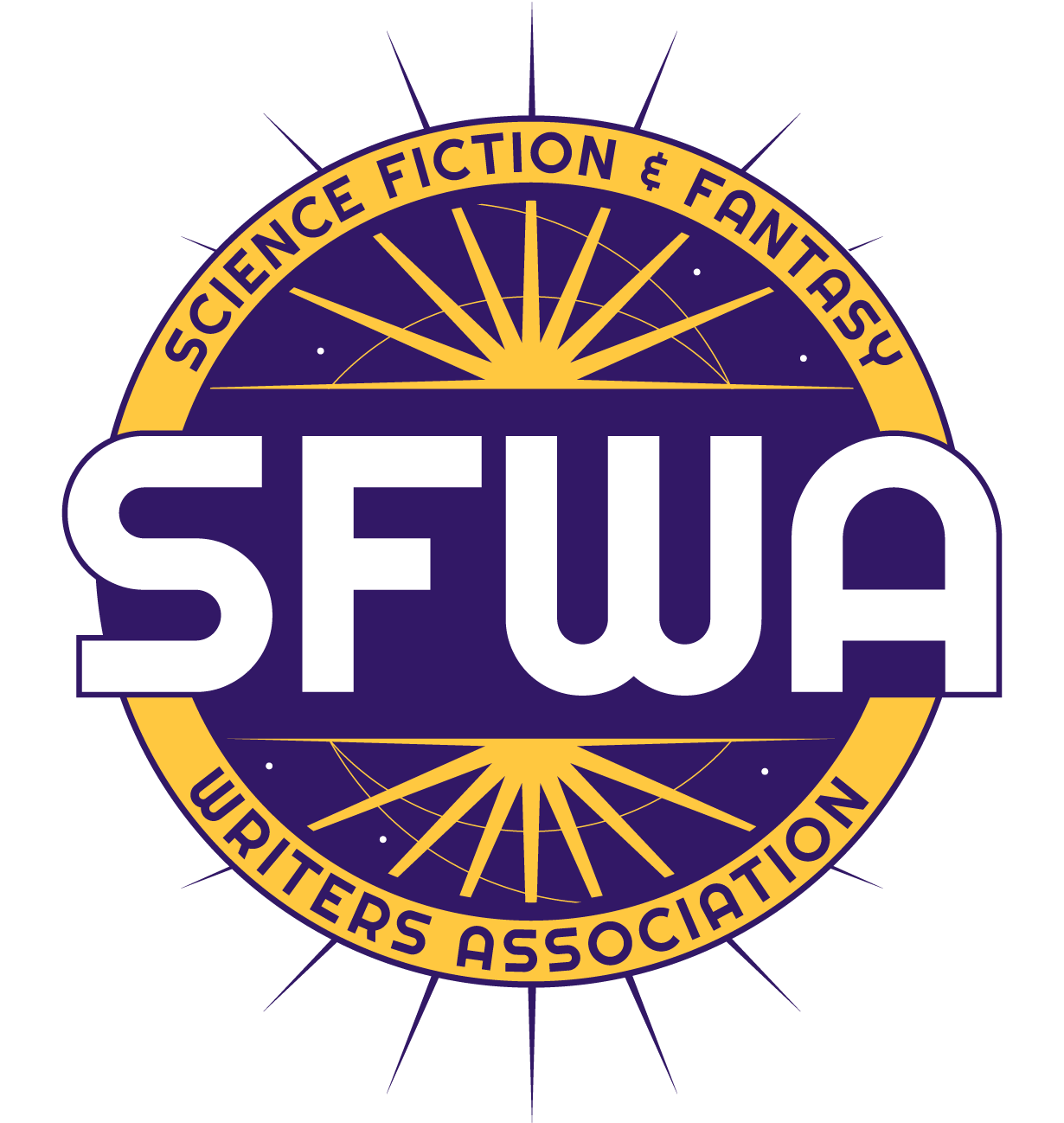10 Things I Learned While I Was A Director-At-Large for SFWA
by Jennifer Brozek
 As of 1 July 2017, I stepped down from a two year stint as a Director-At-Large for the Science Fiction and Fantasy Writers of America (SFWA). My term was up and I chose not to run again (this time) due to life happening around me. I learned so much from the organization and from the other Directors themselves. I also learned a lot from the SFWA membership through the lens of a board member. To make things easy on me, I’ve distilled it all into the 10 Things I Learned While I Was A Director-At-Large for SFWA.
As of 1 July 2017, I stepped down from a two year stint as a Director-At-Large for the Science Fiction and Fantasy Writers of America (SFWA). My term was up and I chose not to run again (this time) due to life happening around me. I learned so much from the organization and from the other Directors themselves. I also learned a lot from the SFWA membership through the lens of a board member. To make things easy on me, I’ve distilled it all into the 10 Things I Learned While I Was A Director-At-Large for SFWA.
10: It was one of the most rewarding volunteer positions I’ve been in.
I worked with a stellar team of people I wouldn’t have had a chance to work with before I stepped up to the plate. Being a Director-At-Large gave me an inside view on how SFWA works, its goals for the organization, how to help its membership and writers all over the world as well as allowed me to help shepherd some large projects towards fruition. Watching Game Writers be admitted to SFWA was beyond awesome. It was one of my goals from the moment I became a member of SFWA. Watching the Speakers Bureau come online in a working capacity was very fulfilling. Instituting the first board member “office hours” was a thrill. Streamlining the EMF process is still in progress, but I know I’ve done my part. When you work on the Board of Directors, your work changes the organization.
9: It was one of the most difficult volunteer positions I’ve been in.
There are good and bad things that happen when you lead by committee—especially a committee of volunteers. When one committee talks to another committee, things move at a (perceived) glacial pace. It makes it difficult to know when to poke someone (or a committee) for an answer you are waiting on. Make no mistake, SFWA is governed and run by committee. We have a President who focuses our tasks, puts out fires, pokes committees for you, but… you’re still working with a series of committees made up of volunteers with different wants/needs, different communication styles, different time allotments, different backgrounds, and different perspectives. This makes it hard. You can’t push too much. You can’t not push. Everything is a delicate balance between need, time, and availability. The entire time you work on SFWA’s Board of Directors, you try to keep this in mind. Sometimes you fail. Most of the time you succeed. You’re going to remember the failures more.
8: The Board of Directors has their hands full.
There are so many projects and concerns that that Board of Directors handles that every single board member is busy. Really busy. Each one is a point of contact to every single committee SFWA has. There are five main areas that SFWA focuses on: Support, Promotion, Information, Defense, and Advocacy. I’m linking the info graphic that describes each one. For every single bullet point, someone in SFWA has championed that project and a board member has been or is a point of contact. The Board works for SFWA and its members. It also works to promote the welfare of all writers.
7: The Board of Directors frequently has their hands tied.
SFWA is a 501(c)(3) organization. As a nonprofit organization, there are a number of specific rules and restrictions SFWA must follow. As an organization incorporated in California, there are a different set of rules and regulations SFWA must follow. As an organization with a specific set of goals—the promotion and advocacy of authors—the organization itself has created and voted on a third set of rules and restrictions SFWA must follow. All of this means when someone brings up an issue involving everything (but not limited to) money, donations, charity, advocacy, state or federal laws, taxes, theft, slander, or plagiarism… there are so many hoops, rules, restrictions, and laws that must be checked before the Board can act.
Not only that, when it comes to individual conflicts, there is a specific jurisdiction SFWA can work within: Did the incident happen at a SFWA sponsored event/green room/panel? Did the incident happen using SFWA resources? Did a SFWA member use their membership/position in SFWA to incite/abuse/manipulate? Is the complaint specific enough? Does it an individual or a large numbers of authors?
These are the kinds of questions we must ask before we act. More often than not, we need to refer complaints to various internal committees, have private, unofficial conversations with individuals, or make blanket statements that SFWA does not approve of a specific action. Sometimes, there’s nothing the Board can do except lend emotional/moral support.
6: Authors, even your favorite author, are only human.
Everyone has either heard the story, or experienced it themselves: “I used to love reading AuthorX, but then I met them and discovered they are terrible. I can’t read their work anymore.” Sometimes it is hard to discover your idols are human with human wants, needs, foibles, opinions, habits, and flaws. When you work on SFWA’s Board of Directors, you usually see all the behind-the-scenes stuff.
Sometimes, you work with an author/editor on a SFWA project and it doesn’t go as smoothly as you like. Sometimes, it appears as if an author once admired has nothing but scorn for the work you are doing and no desire to help out—just kvetch and complain. Sometimes, authors come to the Board at their worst—financial or medical difficulties, personal conflicts that threaten to spiral out of control, issues with editors, agents, or publishers. They don’t have their “public face” on. They are human. They make mistakes. They can be hurt. They put their pants on one leg at a time.
This is one of those learning lessons that really surprised me. I’m not sure why. I just know it did.
5: Discretion is the better part of valor.
With everything I’ve mentioned so far, one of the most valuable things a Director-At-Large (all the board members, really) can do is keep their ears open and their mouths shut. More than just listening, there is a compact with the membership that when an-all-too-human author comes to us with an issue, that issue remains private until it is decided amongst the board and the member themselves that the issue can go public. There are many issues brought to board members that have nothing to do with SFWA, but board members are in perceived positions of power and sometimes, authors just need an authority figure to listen and unofficially advise. They also need to know what they are saying will remain on the down low.
4: Volunteers are the lifeblood of SFWA.
You get out of SFWA what you put into it. SFWA is an organization of the members and for the members. By extension, SFWA works for the betterment of all authors. Volunteers are SFWAs lifeblood. There are only so many things the Board—who are all volunteers—can do at one time. If you see something that’s wrong or lacking in the organization, speak up and step up. The Board loves nothing more than a motivated volunteer. If you don’t know what needs doing, we have a Volunteer Coordinator who would love to put you to work. We have various committees that need people. Need you. You will learn more about SFWA, the industry, and yourself when you volunteer at SFWA. It will help you feel more connected to the membership and the industry as a whole.
3: Patience is a virtue.
As SFWA is a volunteer organization, there is only so much pushing one can do. Even if you are waiting on something from someone else before you can get your project moving/done, you must remember that volunteers have other jobs, other duties, and other deadlines. In all cases—working on projects, listening to incident reports, just checking in on the membership, reading the forums—patience is a virtue. Slow, deep breaths. Be clear and concise in your communication. Give specific timelines, concrete tasks, and manageable goals; even to yourself. Especially to yourself. Know what you need and move at a steady pace.
2: The Board of Directors is made up of good people.
I’ve never worked with such dedicated people before. Every single one of them works hard and wants to do good by the membership. Every single one of them puts in hours of work each week. They seriously discuss every issue, try to consider all angles, and do their best to work within the rules. Though we haven’t always agreed on everything, I’m proud to have worked alongside them. I feel safe and secure knowing that the people making up the Board is there. I didn’t even feel guilty (much) for stepping down. The new people who stepped up are competent and knowledgeable.
1: I will probably run for the Board again—sometime in the future.
While life is at a point where I don’t have time to be on the Board, I am still working on specific projects for them. I will probably run for the Board again in the future. I know (mostly) what to expect and still believe that not only is volunteering for the Board a worthwhile endeavor, it’s one that everyone should try to experience at least once during their time in SFWA.
•••
Jennifer Brozek is an award winning author, editor, and tie-in author. Two of her works, Never Let Me Sleep and The Last Days of Salton Academy have been nominated for the Bram Stoker Awards. She was awarded the Scribe Award for best tie-in Young Adult novel for The Nellus Academy Incident. Grants Pass won an Australian Shadows Award for best edited publication. In-between cuddling her cats, writing, and editing, Jennifer is an active member of SFWA, HWA, and IAMTW. She keeps a tight writing and editing schedule and credits her husband Jeff with being the best sounding board ever. Visit Jennifer’s worlds at jenniferbrozek.com.


